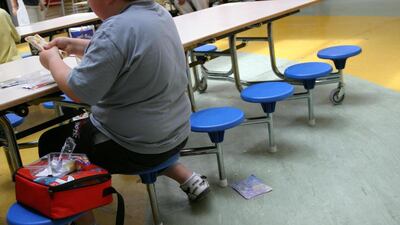Pupils will be encouraged to increase their physical exercise to 150 minutes a week under new government plans to reduce childhood obesity.
School healthcare staff will receive training to spot signs of obesity and ill health under a comprehensive child screening programme.
An agreement has been signed by Dubai Health Authority and the Knowledge and Human Development Authority to implement the health policy across schools in the emirate.
The policy will be valid for the next five years with an aim to create a safe, healthy and motivating school environment for pupils.
It has been developed with consultation with Dubai Sports Council to find the best way to offer healthy exercise choices for children.
“School health is undoubtedly an important focus,” said Humaid Al Qutami, director-general of DHA.
“We recently launched the Dubai School Health Policy after extensive consultation and feedback with various stakeholders including the KHDA. “We are pleased to continue our collaboration with KHDA with the common goal of implementing this policy that will unify several school health practices.
“It will lay the foundation for schools to adhere to certain standards to ensure physical, emotional, social and psychological well-being of school children.”
________________
Read more:
Dubai's private school day may get longer to fit in new PE classes, say headteachers
One in four children think playing video games and reading book is exercise, UAE study finds
Fattest generation - millennials - could face cancer crisis, say UAE doctors
__________________
Childhood obesity is a major health challenge facing the UAE, and is associated with an increased risk of Type 2 diabetes.
It is estimated that 40 per cent of children in the UAE are either obese or overweight.
Under the new agreement, DHA will train healthcare professionals on its comprehensive screening programme that includes vision, dental, obesity and mental health screening, to promote early intervention, unify the screening process, and ensure all schools follow comprehensive guidelines.
School clinics will need to enter details of every student’s vaccination record in DHA’s electronic system known as Hasana.
Parents will have access to their children’s record through an app.
"The well-being and happiness of our students and the adoption of healthy lifestyles are a priority for our staff,” said Dr Abdulla Al Karam, chairman of the board of directors and director general of the KHDA in Dubai.
“We will continue to work with our colleagues at DHA to support our stakeholders – schools, universities, students, parents, educators and investors – to reach our common goals, and to improve the happiness of our students and our community to achieve the future objectives of Dubai.”


